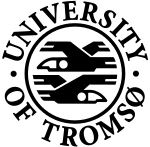University of Tromsø
Universitetet i Tromsø Romssa universitehta | |
 | |
| Type | Public University |
|---|---|
| Established | 1968 |
| Rector | Anne Husebekk |
| Students | 11948.1[1] |
| Location | , |
| Affiliations | EUA, UArctic |
| Website | www.uit.no |
The University of Tromsø - The Arctic University of Norway (Template:Lang-no; is the world's northernmost university.[2] Located in the city of Tromsø, Norway, it was established in 1968, and opened in 1972. It is one of eight universities in Norway. The University of Tromsø is the largest research and educational institution in northern Norway. The University's location makes it a natural venue for the development of studies of the region's natural environment, culture, and society.
The main focus of the University's activities is on the Auroral light research, Space science, Fishery science, Biotechnology, Linguistics, Multicultural societies, Saami culture, Telemedicine, epidemiology and a wide spectrum of Arctic research projects. The close vicinity of the Norwegian Polar Institute, the Norwegian Institute of Marine Research and the Polar Environmental Centre[3] gives Tromsø added weight and importance as an international centre for Arctic research. Research activities, however, are not limited to Arctic studies. The University researchers work within a broad range of subjects and are recognised both nationally and internationally.
On January 1, 2009 the University of Tromsø merged with Tromsø University College. On August 1, 2013 the university merged with Finnmark University College to form Universitetet i Tromsø – Norges arktiske universitet (The University of Tromsø – The Arctic University of Norway), thereby adding campuses in Alta, Hammerfest and Kirkenes.[4] On January 1, 2016 Narvik University College and Harstad University College merged with UiT - The Arctic University of Norway. As of January 2016 the university now has 6 campus locations in northern Norway, the main campus being Tromsø.
Faculties and other units[5]

Faculty of Health Sciences
- Department of Medical Biology
- Department of Community Medicine
- Department of Clinical Medicine
- Department of Pharmacy
- Department of Clinical Dentistry
- Department of Psychology
- Department of Health and Care Science
Faculty of Science and Technology
- Department of Physics and Technology
- Department of Geology
- Department of Computer Science
- Department of Engineering and Safety
- Department of Chemistry
- Department of Mathematics and Statistics
- Centre for Theoretical and Computational Chemistry
Faculty of Humanities, Social Sciences and Education
- Department of Archaeology and Social Anthropology
- Department of Philosophy
- Department of History and Religious Studies
- Department of Culture and Literature
- Department of Education
- Department of Sociology, Political Science and Community Planning
- Department of Language and Linguistics
- The Barents Institute
- Centre for Women's and Gender
- Research Centre for Peace Studies, Tromsø (CPS)
- Centre for Sami Studies
- Center for Advanced Study in Theoretical Linguistics
Faculty of Biosciences, Fisheries and Economics
- Department of Arctic and Marine Biology
- Norwegian College of Fishery Science
- School of Business and Economics (HHT)
Faculty of Fine Arts
- Department of Music, Dance and Drama
- Academy of Contemporary Art and Creative Writing
Faculty of Law
Faculty of Sports, Tourism and Social Work
- Department of Child Welfare and Social Work
- The School of Sport Sciences
- Department of Tourism & Northern Studies
Other units
- Tromsø University Museum
- The University Library of Tromsø
- Barentsinstituttet (The Barents' Institute) is owned by the university, as of 2012.[6]
Honorary doctors[7]
- Narve Bjørgo, Norway (2008)
- Ole Henrik Magga, Norway (2008)
- Barbara Neis, Canada (2008)
- Steven Pinker, USA (2008)
- Ottar Brox, Norway (2003)
- Erica I.A. Daes, Greece (2003)
- Tor Hagfors, Norway (2003)
- Nawal el-Saadawi, Egypt (2003)
- Tenzin Gyatso, the 14th Dalai Lama, Tibet (2001)
- Mordechai Vanunu, Israel (2000)
- William Nygaard, Norway (1998)
- Salman Rushdie, Great Britain (1998)
- Mikhail Gorbachev, Russia (1998)
- Robert Paine, Canada (1998) [8]
- Susanne Romaine, England (1998)
- Rigoberta Menchú Tum, Guatemala (1996)
- Carsten Smith, Norway (1995)
- Desmond Mpilo Tutu, South Africa (1994)
- Jørn Dyerberg, Denmark (1993)
- Torstein Bertelsen, Norway (1993)
- Georg Henrik von Wright, Finland (1993)
- Ragnhild Sundby, Norway (1993)
- Helga Marie Hernes, Norway (1993)
- Parzival Copes, Canada (1993)
- Amy van Marken, Nederland (1987)
- Kjell Bondevik, Norway (1982)
- Peter F. Hjort, Norway (1982)
Notable employees
Logo
The ravens in the university's logo are Huginn and Muninn. In Norse mythology, Hugin and Munin travel the world for Odin, bringing him news and information. Huginn represents thought and Muninn memory. Ravens are an early Norse symbol, used f.ex. on the raven banner.
See also
References
- ^ the offecial website of UIT
- ^ Welcome to the University of Tromsø
- ^ Polar Environmental Centre
- ^ [1]
- ^ Navn på enheter ved UiT (bokmål, nynorsk, samisk, engelsk og forkortelser)
- ^ Isaksen, Lisbeth (2012-05-04). "Venn i vekst". Dagbladet. p. 73.
I dag eies Barentsinstituttet av Universitetet i Tromsø.
- ^ Æresdoktorer ved Universitetet i Tromsø
- ^ Thuen, Trond (2010). "Robert Paine (1926-2010)". Acta Borealia. 27 (2): 237–238. Retrieved 30 May 2016.
- ^ "Nekrologer". Aftenposten. 2012-06-13. p. 15.
